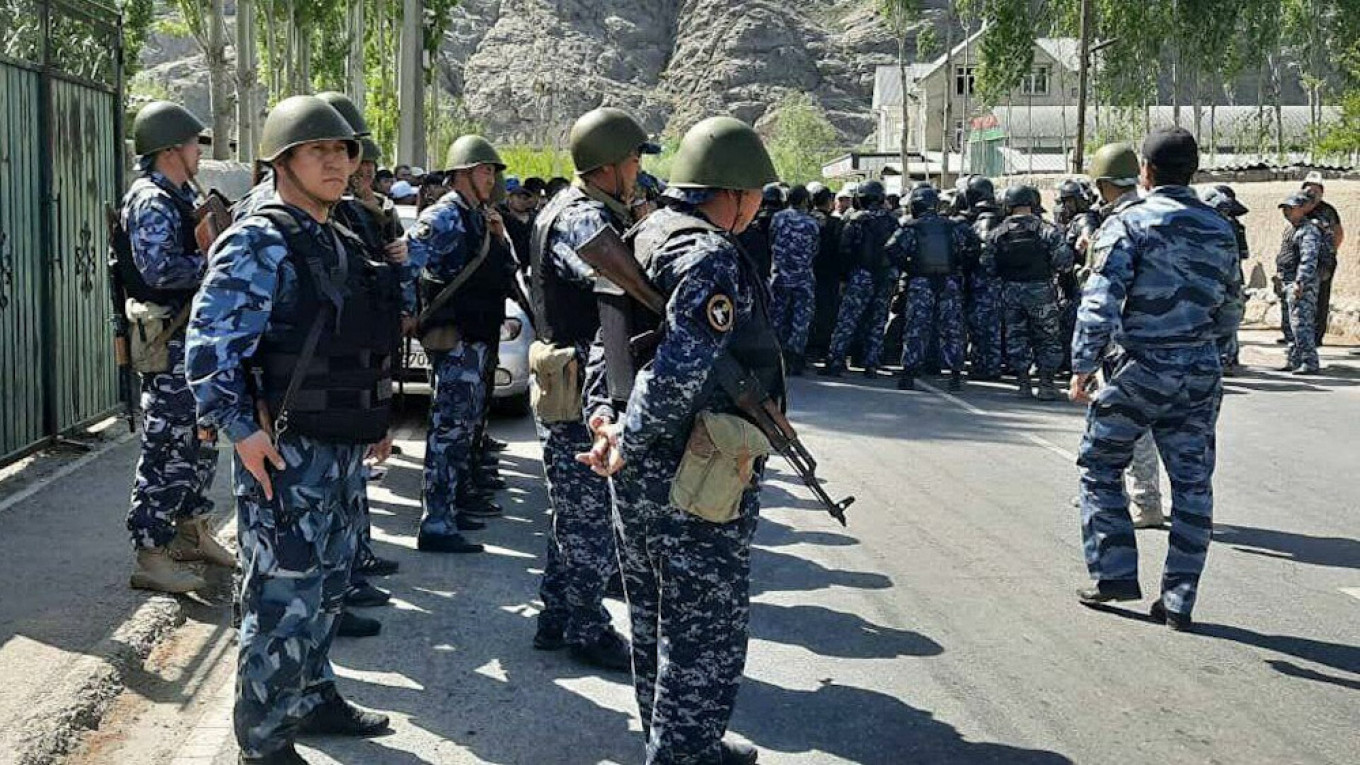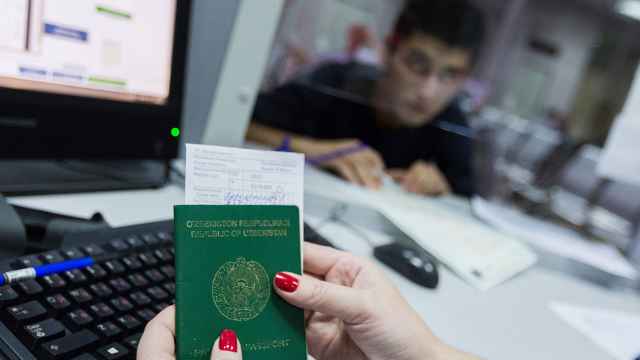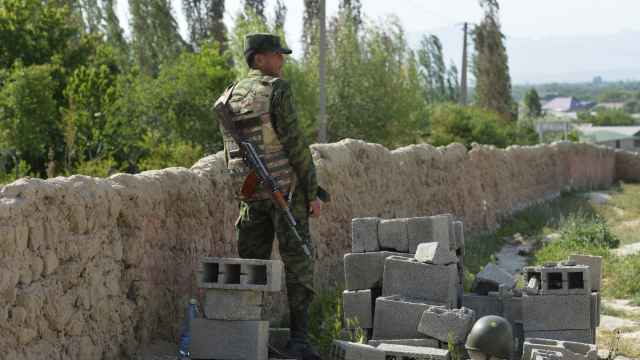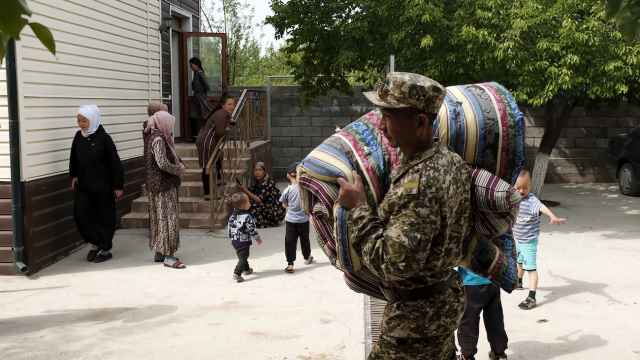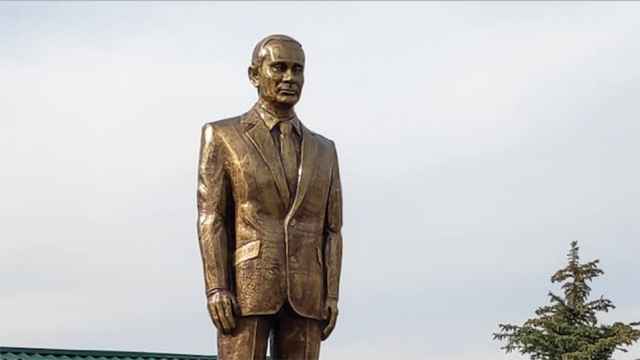Officials in Kyrgystan and Tajikistan sought to ease tensions on Friday after major clashes between the ex-Soviet neighbors in Central Asia left over a dozen dead and thousands displaced in Kyrgyzstan.
Clashes between communities over land and water along the pair's long-contested border are regular occurrences, with border guards often getting involved.
But the shooting that broke out Thursday between the two militaries was the heaviest fighting in years and raised fears that it might escalate into a wider conflict.
For the moment, high-level contacts between the two impoverished, mountainous countries have continued, offering hope that the conflict — which began after communities clashed over an important piece of river infrastructure — can be cooled.
Kyrgyzstan's national security chief Kamchibek Tashiyev told journalists that he had met with Tajik counterpart Saimumin Yatimov on "neutral territory" at the border on Friday.
Tashiyev pledged that problems over their shared border will be resolved "in the next few days."
Tajikistan did not immediately release a statement on the meeting.
Kyrgyzstan said Friday that 13 of its citizens had died, including one child, with dozens of properties burned during the clashes.
Local authorities in Kyrgyzstan's southwestern Batken region said that shooting along the shared border was still happening "periodically" despite a ceasefire agreed on Thursday evening.
Military representatives of the two countries did not immediately confirm the claims.
Over 10,000 Kyrgyz citizens have been evacuated from two districts bordering Tajikistan where the fighting had been most intense, according to Kyrgyz authorities.
More than a third of the two countries' border is disputed, with the area surrounding the Tajik enclave of Vorukh, where Thursday's conflict erupted, a regular flashpoint over territorial claims and access to water.
On Friday, neighboring Uzbekistan's leader Shavkat Mirziyoyev's office said he had held separate talks by telephone with Tajik leader Emomali Rakhmon and Kyrgyz president Sadyr Japarov.
During the phone calls "it was stated that all issues raised by the sides should be decided on the basis of dialogue in the spirit of relations of centuries-old friendship," Mirziyoyev's office said.
Properties torched
Tajikistan, a closed authoritarian state, has so far acknowledged no casualties or damages from the clashes.
Kyrgyzstan, in contrast, published a detailed list of properties in its Batken region that had been damaged.
Among the properties burned down during the violence were a border post, more than 20 homes, a school, eight shops and a casino, according to the emergencies ministry.
Thousands of people evacuated from villages at the center of the conflict have been "placed in specially organised points" in Batken's administrative centre "or went to visit relatives," according to authorities in the Batken region.
Military units from the two countries began exchanging fire on Thursday, but later that day agreed a ceasefire following talks at several different levels of government.
Tajikistan's national security committee had said earlier on Thursday that two citizens had been admitted to hospital, with one in serious condition.
Its security committee accused Kyrgyz soldiers of opening fire on Tajik troops at the Golovnaya water distribution point, located on the Isfara River, on Thursday.
It said Kyrgyz and Tajik civilians had become embroiled in a dispute over the vital piece of river infrastructure on Wednesday.
Border disagreements between the three countries that share the fertile Fergana Valley — Kyrgyzstan, Tajikistan and Uzbekistan — stem from demarcations made during the Soviet era.
The knotting, twisting frontiers left several communities with restricted access to their home countries.
Kremlin spokesman Dmitry Peskov said Friday that Russia, a strategic ally to both Kyrgyzstan and Tajikistan, was "deeply concerned" by the clashes but welcomed increasing contacts between the neighbouring countries.
He added that Russian President Vladimir Putin is "always ready" to play a "mediating role."
A Message from The Moscow Times:
Dear readers,
We are facing unprecedented challenges. Russia's Prosecutor General's Office has designated The Moscow Times as an "undesirable" organization, criminalizing our work and putting our staff at risk of prosecution. This follows our earlier unjust labeling as a "foreign agent."
These actions are direct attempts to silence independent journalism in Russia. The authorities claim our work "discredits the decisions of the Russian leadership." We see things differently: we strive to provide accurate, unbiased reporting on Russia.
We, the journalists of The Moscow Times, refuse to be silenced. But to continue our work, we need your help.
Your support, no matter how small, makes a world of difference. If you can, please support us monthly starting from just $2. It's quick to set up, and every contribution makes a significant impact.
By supporting The Moscow Times, you're defending open, independent journalism in the face of repression. Thank you for standing with us.
Remind me later.


